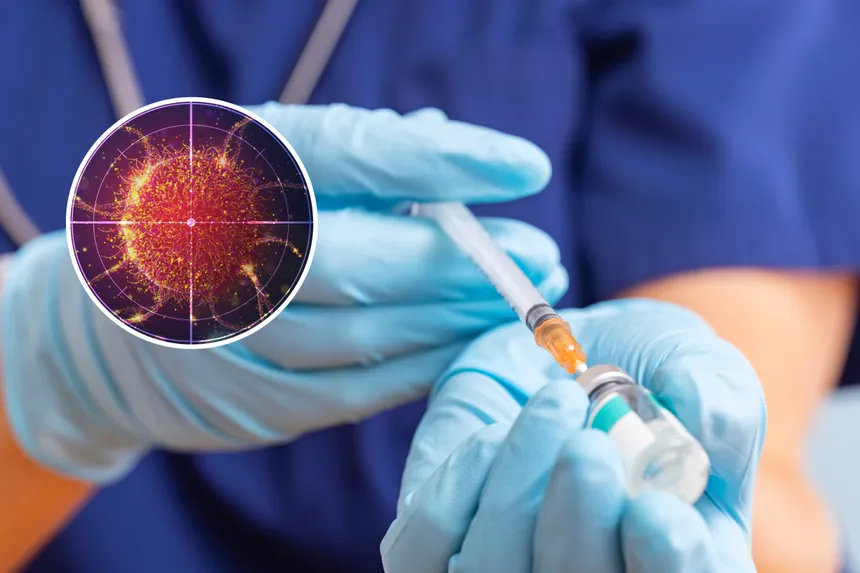Russia has unveiled its new cancer vaccine, a groundbreaking development that could revolutionize cancer treatment worldwide. Scheduled for free distribution by 2025, the vaccine uses advanced mRNA technology to effectively target cancer cells. With its promise to transform oncology, the news has sparked global interest and raised important questions: How does it work? What are the results of the cancer vaccine clinical trials? And what could this mean for patients, healthcare systems, and global equity? Let’s discuss the key details.
So, How Does A Cancer Vaccine Work?
Cancer vaccines are designed to strengthen the immune system to fight cancer cells. Unlike preventive vaccines for diseases like measles, cancer vaccines can either prevent certain types of cancers or treat existing tumors (therapeutic vaccines).
Russia’s new cancer vaccine falls under the therapeutic category. Using the same mRNA technology that gained prominence during the COVID-19 pandemic, the vaccine trains the immune system to recognize and attack cancer cells specifically. This approach minimizes damage to healthy cells, significantly improving over traditional treatments. It is helpful in treating various cancers which are recurrent cancers like Prostate cancer or Breast Cancer even after Mastectomy.
Now the main question is that how exactly does russia’s vaccine work.
How Does Russia’s Cancer Vaccine Work
The vaccine leverages mRNA technology to deliver genetic instructions to the body’s immune system. These instructions prompt the production of proteins that mimic those found on cancer cells. This helps the immune system recognize and destroy cancerous cells without affecting healthy tissues.
What makes this vaccine particularly promising is its adaptability—it can be customized to target various types of cancer. Furthermore, its precision reduces side effects compared to treatments like chemotherapy and radiation caused due to Proton therapy etc. The cutting-edge science behind this vaccine could redefine how we think about cancer treatment.
Now, let's take a look at the statistics.
Clinical Trials Overview
Russia's new mRNA cancer vaccine has demonstrated promising results in pre-clinical trials. Studies indicate that the vaccine reduced tumour growth rates by up 80% and prevented metastasis in over 70% of cases. Additionally, subjects treated with the vaccine experienced significantly longer survival times compared to untreated groups.
Despite these encouraging outcomes, several challenges remain. Questions about long-term efficacy, scalability, and effectiveness across diverse populations still need to be addressed. The results of ongoing human clinical trials, expected in mid-2025, will be critical in providing answers to these concerns.
So, what's the catch?
What Patients Should Know about Cancer Vaccine?
It is important for people to know that the vaccine may not yet be universally available. Russia has announced plans for global free distribution by 2025, but initial access might be limited to countries with existing healthcare collaborations. Additionally, the vaccine's eligibility criteria may prioritize certain types of cancer, such as advanced-stage or metastatic cancers, and its effectiveness may vary depending on individual health conditions. Patients are encouraged to consult their oncologists to assess whether this treatment could complement their current therapy and to stay informed about updates on its availability in their region.
By understanding these specifics, patients can better navigate the opportunities this groundbreaking vaccine offers while preparing for its potential challenges.
Moving on, let's discuss the economic effect of this vaccine.
Ethical and Economic Implications of Russia’s Cancer Vaccine
The introduction of Russia’s cancer vaccine raises several ethical and economic questions. On one hand, the decision to distribute the vaccine free of charge by 2025 reflects a commitment to healthcare equity. On the other hand, challenges like funding, production scalability, and global accessibility remain.
For countries with limited healthcare infrastructure, distribution could present obvious logistical challenges. Will wealthier nations have faster access, or will Russia prioritize equitable distribution? These are questions that need addressing to ensure fairness in the global healthcare landscape.
Economically, the vaccine could reduce the financial burden of cancer treatment significantly. Offering a cost-effective solution has the potential to disrupt traditional pharmaceutical markets, shifting the focus toward more accessible treatments. However, this disruption might face resistance from existing stakeholders in the industry.
Now the most important question, how can people get access to this vaccine?
How Is Russia Planning to Distribute This Vaccine Worldwide?
Russia has announced its intention to make the vaccine freely available to patients, both domestically and internationally, by 2025. This ambitious plan includes collaborations with global health organizations and leveraging its biotechnological expertise.
While the announcement is inspiring, several hurdles need addressing, including supply chain logistics, regulatory approvals, and the development of partnerships for distribution in underserved regions. Success in this area could set a precedent for future global healthcare initiatives.
Conclusion
Russia’s new cancer vaccine is undoubtedly a breakthrough in the fight against cancer. With its innovative use of mRNA technology, promising results from cancer vaccine clinical trials, and ambitious distribution plans, it offers hope to millions worldwide. However, its success will depend on addressing ethical, economic, and logistical challenges effectively.
The future of cancer treatment is here, and this vaccine is paving the way toward a world where cancer could be tackled more efficiently and equitably.
FAQs
1. What types of cancer does russia's vaccine target?
The vaccine is adaptable and can be tailored to multiple types of cancers.
2. How effective is the russia's cancer vaccine according to clinical trials?
Initial trials report tumor reduction and increased survival rates, with minimal side effects.
3. Will the cancer vaccine be free globally?
Russia plans to make it free by 2025, but distribution logistics are still being worked out.
4. How is it different from chemotherapy?
Unlike chemotherapy, the vaccine uses mRNA technology to target cancer cells precisely, reducing side effects.






